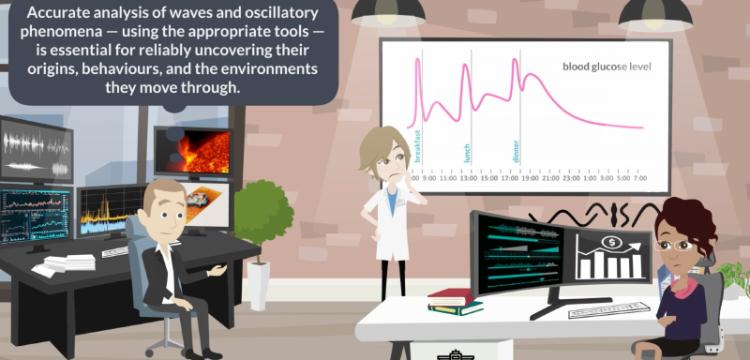
Recent developments in wave science demonstrate its vital role across multiple scientific disciplines, from environmental monitoring to healthcare, engineering, and astrophysics. At the forefront of this innovative field is Queen’s University Belfast, which has recently led a collaborative international effort to enhance wave analysis techniques for better, global outcomes.
Understanding Wave Science and Its Significance
Wave science encompasses the study and analysis of various types of waves—whether in the oceans, in electromagnetic fields, seismic activity, or even within biological systems. This interdisciplinary approach aims to interpret complex data, predict natural disasters, optimize technological systems, and deepen our understanding of the universe.
Queen’s University Belfast, situated in the UK, has become a pivotal institution in this field by fostering collaborations among scientists from around the world. Their recent publication in Nature Reviews Methods Primers highlights how shared methodologies in wave analysis are now shaping scientific progress globally.
International Collaboration Enhances Wave Analysis Methodologies
The recent project involved 26 scientists from 23 institutions across nine countries, including notable entities like Stanford University, the European Space Agency, and the Max Planck Institute. Such diversity underscores the universal importance of wave analysis across different fields and geographic boundaries. The collaboration produced a comprehensive overview of fundamental and advanced tools for wave analysis, which are freely accessible, encouraging widespread adoption and further innovation.
Open-Access Resources for Scientific Advancement
A key outcome from this collaboration is the creation of WaLSA.tools, an open-access repository designed to provide researchers with the latest wave analysis tools, datasets, and collaborative opportunities. This platform aims to foster transparency, reproducibility, and ethics in wave research, thus accelerating scientific discoveries and their application in real-world scenarios.
Real-World Applications of Wave Science
Wave analysis plays a crucial role in understanding natural phenomena and engineered systems, impacting numerous sectors:
- Disaster Prediction: Geophysicists analyze seismic waves to forecast earthquakes and tsunamis, enabling early warning systems that can save lives.
- Renewable Energy: Environmental scientists study wind and ocean waves to optimize the generation of hydro, wind, and tidal energy, contributing to sustainable development.
- Healthcare Diagnostics: Medical professionals interpret ultrasound and electrocardiogram signals to diagnose and monitor health conditions with high precision.
- Space Exploration and Astrophysics: Astrophysicists examine electromagnetic waves from space, assessing space weather and cosmic phenomena that influence satellite operations and astronaut safety.
- Engineering and Infrastructure: Engineers analyze vibrations in bridges and aircraft to ensure structural integrity and safety under various stress conditions.
- Economics and Market Trends: Economists utilize wave analysis techniques to forecast financial trends, assisting policymakers and investors in decision-making.
Queen’s University Belfast: Driving Innovation in Wave Science
Leadership from Queen’s University Belfast, particularly through Dr. Shahin Jafarzadeh and Professor David Jess, exemplifies the university’s commitment to advancing wave science. Their efforts focus on unifying methodologies across disciplines to improve the reliability and reproducibility of results, ultimately influencing global research, policy, and industry practices.
Educational and Research Opportunities
For students and researchers interested in this dynamic field, Queen’s offers postgraduate programs and research opportunities in physics, astrophysics, engineering, and environmental sciences. Engaging with cutting-edge projects like wave analysis fosters skills applicable worldwide and opens pathways for international collaboration.
How to Get Involved with Wave Research and Applications
If you are an aspiring scientist or professional eager to contribute to wave science, consider the following steps:
- Explore academic programs that focus on wave phenomena in physics, engineering, or environmental science.
- Participate in research projects or internships at institutions like Queen’s University Belfast to gain hands-on experience.
- Utilize open-access resources such as WaLSA.tools to stay updated on the latest tools and methodologies.
- Collaborate across disciplines and borders to address complex problems using wave analysis techniques.
Conclusion: The Future of Wave Science2023 and Beyond
As global challenges like climate change, natural disasters, and technological demands intensify, the importance of sophisticated wave analysis becomes more evident. Queen’s University Belfast’s leadership exemplifies how international collaboration can drive innovation, ensuring that wave science continues to contribute solutions to real-world problems. By embracing shared methodologies and open resources, the scientific community can unlock new discoveries, promote sustainable development, and enhance safety worldwide.
Interested in advancing your knowledge or contributing to this field? Start exploring programs, research opportunities, and resources today to be part of the ongoing wave of scientific progress.

